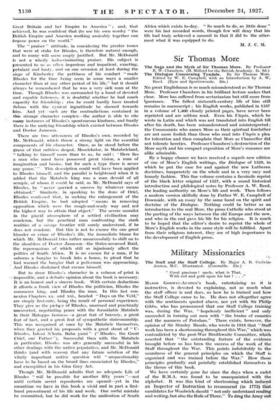Sir Thomas More
The Saga and the Myth of Sir Thomas More. By Professor R. W. Chambers. (H. Mill ord for the British Academy. 2s. 6d.) The Dialogue Concerning Tyndale. By Sir Thomas Moire. Edited by W. E. Campbell, with an Introduction by A. W. Reed. (Eyre and Spottiswoode. 30s.)
No great Englishman is so much misunderstood as Sir Thomas More. Professor Chambers in his brilliant lecture makes that
clear. More has suffered from sectarianism but still more from ignorance. The fullest sixteenth-century life of him still remains in manuscript ; his English works, published in 1557 in a volume of 1,400 closely printed pages, have never been reprinted and are seldom read. Even his Utopia, which he wrote in Latin and which was not translated into English till after his death, has been misunderstood and misinterpreted ; the Communists who annex More as their spiritual forefather are not more foolish than those who read into Utopia a plea for toleration and then complain that More as Chancellor did not tolerate heretics. Professor Chambers's destruction of the More myth and his compact exposition of More's romance are
alike admirable.
By a happy chance we have received a superb new edition
of one of More's English writings, the Dialogue of 1529, in which he put the case for and against the new Lutheran doctrines, temperately on the whole and in a very racy and homely fashion. This fine volume contains a facsimile reprint of the black letter original of 1557, with a sound historical introduction and philological notes by Professor A. W. Reed, the leading authority on More's life and work. Then follows a modern version skilfully done by Father W. E. Campbell of Downside, with an essay by the same hand on the spirit and doctrine of the Dialogue. Nothing could be -better as an introduction to the real More, the pious Catholic who stood at
the parting of the ways between the old Europe and the new, and who in the end gave his life for his religion. It is much to be hoped that the editor's desire to reprint the whole of More's English works in the same style will be fulfilled. Apart from their religious interest, they are of high importance in the development of English prose.






























 Previous page
Previous page